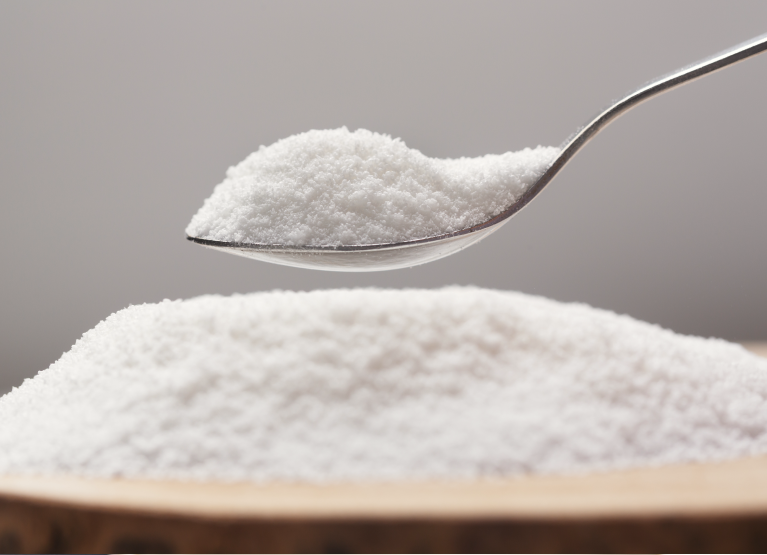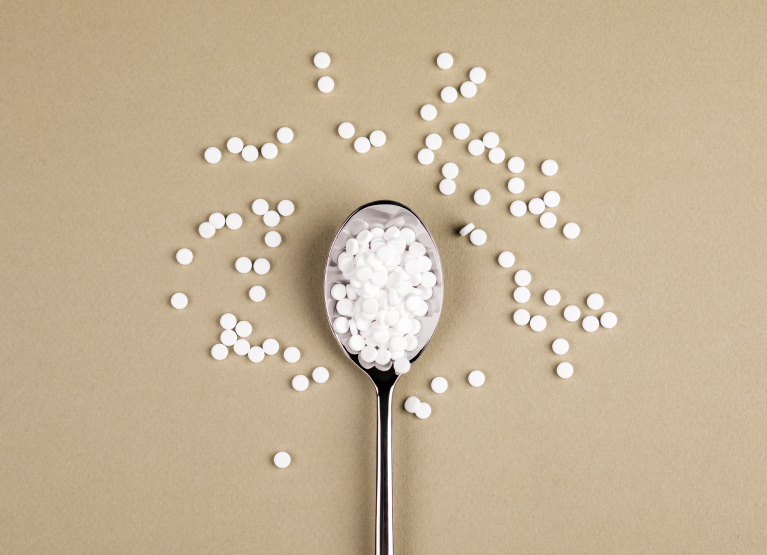Sucralose vs. Aspartame: Comparing Artificial Sweeteners

Key Takeaways
If you chew sugar-free gum or drink diet (or sugar-free) beverages, you’ve likely encountered sweeteners like aspartame and sucralose. Similar to stevia, these sugar substitutes are sweeteners that are used in a wide variety of products.
But is one better than the other? Read on to learn more about the similarities and differences between sucralose and aspartame.
Is Sucralose the Same as Aspartame?

Sucralose and aspartame are both artificial, high-intensity sweeteners often used instead of table sugar. Aspartame is about 200 times sweeter than sugar, while sucralose is about 600 times sweeter. These sweeteners also contain different amounts of calories and carbs, which we'll learn about later.
While each sugar substitute is used to sweeten foods and beverages without adding significant calories or carbohydrates, they are each produced differently and can have distinct effects on the body.
What is Sucralose?
Sucralose is the only non-caloric sweetener made from sugar. It is made by replacing three hydroxyl groups in sugar with three chlorine atoms. This process creates a sweetener that cannot be broken down by the body, meaning that it imparts zero calories when eaten. The FDA approved sucralose for human consumption in 1998.
How Is Sucralose Used?
Sucralose is a sugar substitute and food additive used in many commercial food products, including baked goods, sweet foods, beverages, chewing gum, gelatin, and frozen dairy desserts. It is also available as a tabletop sweetener under the brand name Splenda.
Splenda, however, also contains maltodextrin and dextrose, which act as sweeteners and preservatives and add some additional calories and carbohydrates compared to plain sucralose. Some studies have shown that sucralose can generate toxic compounds when heated, making it unsuitable for baking.
Benefits of Sucralose
The main benefit of sucralose is that it is calorie-free and not metabolized by the body's normal pathways. Since it's an alternative sweetener, it can be a beneficial alternative to table sugar as it will likely promote less of a glucose response than regular sugar. While you may not want to consume it daily since it can impact the gut, it can be used as an occasional alternative.
Sucralose is also non-cariogenic, meaning it doesn't interact with bacteria in your mouth and is not likely to cause tooth decay.
What is Aspartame?

Aspartame is a low-calorie sweetener discovered in 1965 and approved by the FDA in the 1980s. Chemically, aspartame is a synthetic dipeptide formed by the reaction of two amino acids: L-aspartic acid and L-phenylalanine methyl ester. Unlike most other low-calorie sweeteners, it is completely broken down by the body.
Aspartame has about four calories per gram, just like sugar. However, because it is 200 times sweeter than sugar, much less is needed to achieve the same sweet taste, keeping the calories per serving very low.
How is Aspartame Used?
Aspartame is sold as a tabletop sweetener under the brand names NutraSweet and Equal, which also contain sweeteners like maltodextrin and acesulfame potassium. It is also used to sweeten many commercial products, including chewing gum, breakfast cereal, diet sodas, ice cream, yogurt, and carbonated beverages such as Diet Pepsi and Diet Coke.
It's a dry base for certain foods, like instant coffee and tea, gelatins, puddings, fillings, and dairy products and toppings. It is not generally found in baked goods because it loses its sweetness once heated. Aspartame is also found in about 600 pharmaceutical products.
Benefits of Aspartame
Studies show that aspartame has little direct effect on blood glucose. It can also intensify and extend fruit flavors, like cherry and orange, in foods and drinks. This is why the flavor and sweetness of chewing gum sweetened with aspartame last longer than gum sweetened with real sugar.
Sucralose vs Aspartame: How do They Compare?

So, what is the difference between aspartame and sucralose? Let's have a better look at what sets these two sweeteners apart.
Nutritive vs. Non-Nutritive
Sucralose is a non-nutritive sweetener, while aspartame is a nutritive sweetener. To be considered non-nutritive, a sweetener has to contain less than two percent of the calories in an equivalent amount of sugar. Non-nutritive sweeteners such as sucralose and saccharin are very low in calories or have no calories at all.
Aspartame does add caloric value to the foods that contain it, making it a nutritive sweetener. To be considered nutritive, a sweetener must contain more than two percent of the calories in an equivalent amount of sugar. However, aspartame is usually added in such small amounts that any calories it may add are usually minimal.
Production
Aspartame and sucralose are both synthetic non-sugar sweeteners, meaning they are created chemically and are not found in nature. Aspartame is formed by the reaction of the amino acids L-aspartic acid and L-phenylalanine methyl ester. As mentioned earlier, sucralose is made by replacing three hydroxyl groups in sugar with three chlorine atoms.
Taste
Sucralose is about 600 times as sweet as sucrose (or normal sugar), while aspartame is about 200 times as sweet. Because it's the only sugar substitute made from sugar, sucralose has a very sugar-like taste without the bitter aftertaste sometimes present in sugar substitutes such as stevia.
Conversely, some people find that aspartame has a bitter and metallic aftertaste. For this reason, it is often blended with other sweeteners to minimize its aftertaste.
How Sucralose and Aspartame Affect Your Health
How do sucralose and aspartame compare in terms of their effects on health? Do they affect your blood sugar levels? Let's take a closer look at their potentially harmful effects.
Blood Sugar and Insulin Levels

The purported benefit of sugar substitutes is that they are unlikely to affect your blood sugar. But is this really true? One 2003 study of 128 people with type 2 diabetes found that a daily dose of sucralose ingestion that was three times the recommended daily intake did not affect the subjects' blood glucose.
However, a 2013 study found that sucralose has an adverse effect on glucose and insulin responses in people who consume little or no sucralose and other non-nutritive sweeteners. Newer clinical studies have also demonstrated that sucralose may affect the intestinal tract microbiome, impair insulin sensitivity, and eventually increase the risk of type 2 diabetes and obesity.
This concerns diabetes risk since reduced insulin sensitivity is a known risk factor for insulin resistance and diabetes. More research is needed to determine the connection between sucralose and blood sugar. However, according to Dr. Danielle Kelvas of the HCG Institute,
"Recent studies currently suggest that sucralose intake is safe for most people."
In the case of aspartame, a 2016 study of 2,856 obese adults found that it was associated with glucose intolerance. However, other studies have stated that it does not affect glucose tolerance or insulin levels.
A 2018 systematic review of studies that link aspartame to its effects on blood glucose found that aspartame could increase cortisol levels and may be associated with insulin deficiency or resistance. However, the researchers noted that there was limited evidence between aspartame and blood glucose or insulin production.
Sounds complicated, doesn’t it? Don’t worry, the takeaway from all this is quite simple. As the nutrition team at Nutrisense explains, everyone responds differently to alternative sweeteners. If you use a tool to monitor and track your glucose levels, like a continuous glucose monitor, for example, you could see this represented differently in the data for different people! Most likely, a majority of people will see no glucose response from these sweeteners, while others may see a response from them. That's why it's important to test and see how it's impacting your body instead of following generic advice.
Metabolism and Body Weight
Do sucralose and aspartame impact weight management? A 2014 review found that substituting low-calorie sweeteners like sucralose and aspartame for sugar could result in modest weight loss, reduced fat mass, and waist circumference. However, other studies have shown that artificial sweeteners may increase one's appetite and cravings for sugary foods, which could lead to weight gain in the long run.
As we mentioned earlier, they can also impact the gut microbiome, which can have adverse effects on weight loss. So, remember that while these are good as an occasional alternative, they’re still not great to consume on a daily basis.
Healthy Gut Bacteria
Animal studies have shown that sucralose may harm your gut bacteria by decreasing the amount of healthy bacteria in the gut and may enhance pro-inflammatory gene expression, which can negatively impact other organs, such as the liver.
The research also states that because aspartame is absorbed and broken down rapidly in the small intestine and never reaches the large intestine, it is unlikely to affect the gut microbiome. However, one animal study observed changes in the microbial composition after aspartame intake.
These experimental animals also developed glucose intolerance, although researchers are still trying to understand the mechanisms involved. Long-term human studies are needed to establish how exactly artificial sweeteners may affect the gut microbiome.
Are Sucralose or Aspartame Worse For You Than Sugar?

Artificial sweeteners are often controversial because of their potential negative health effects, particularly in high doses. Though many studies have confirmed their safety, other research has found potentially negative health effects. More research is needed to determine exactly how these sweeteners can affect your health over time.
It's also important to note that most of these studies have had limitations, such as small sample sizes, using high doses that humans are unlikely to consume, or only testing their effects on animals. Currently, both sucralose and aspartame are approved for use by the U.S. Food and Drug Administration (FDA) and the European Food Safety Authority and are considered safe for human consumption.
Health Effects of Sugar
On the other hand, the negative effects of too much sugar have been linked with three times the risk of dying from heart disease. Added sugar can increase your risk of high blood sugar levels, high blood pressure, insulin resistance, fatty liver disease, and obesity — all of which are independent risk factors for cardiovascular disease.
Sugar has also been shown to cause chronic inflammation and is an individual risk factor in developing rheumatoid arthritis. Studies have also shown that sugar greatly increases your chances of developing type 2 diabetes and even certain types of cancer risks.
In the long run, aspartame and sucralose may help reduce your added sugar intake, benefiting your overall well-being. However, it may be a good idea to use them sparingly, as more scientific evidence is needed to determine the long-term effects of aspartame versus sucralose on the body.
So, Should You Use Aspartame or Sucralose?

When it comes to choosing between aspartame or sucralose, it depends on your preference and what you plan to use it for. For example, you may want to avoid using either sweetener when baking, as aspartame loses its flavor after being heated, and sucralose may generate toxic compounds when cooked at high temperatures.
Some studies have also suggested that aspartame has the potential to cause headaches. If you experience headaches or other negative side effects after consuming aspartame, it may be a good idea to avoid it and opt for sucralose or a natural sweetener such as stevia instead.
For people who suffer from gastrointestinal tract disorders, such as irritable bowel syndrome (IBS), both types of sweeteners have been known to cause digestive issues. In this case, it's best to limit or avoid both aspartame and sucralose altogether.
So, do you have to avoid these sweeteners completely? Not necessarily. Most people may be able to tolerate these fine as long as they're not consuming them daily in excessive amounts.
Dr. Kelvas has a slightly different opinion. She says, "In general, I encourage everyone to avoid artificial sweeteners whenever possible. Our body was not created or designed to process anything artificial, and just because the current study says it may be safe doesn't necessarily mean that it's optimal for your health."
At the end of the day, what you should do is work with a healthcare professional to figure out what works best for your unique needs!
Find the right Nutrisense programto turn insight into progress.
See Your Blood Glucose Response to Sweeteners with Nutrisense
Would you like to see how your body reacts to different artificial sweeteners? Instead of following general recommendations, why not sign up for a program like Nutrisense to see the real-time responses and get expert advice on what your body needs?
Everyone's body is unique, so it's important to make choices that work best for you. When you join the Nutrisense program, you'll get access to credentialed experts and continuous glucose monitors (CGMs). You can learn to track your body's response to different foods and sweeteners and discuss these results on 1:1 video calls with our team of expert nutritionists and dietitians.
By understanding your body's individual response, you can customize a healthy diet that works for you and your specific health goals. Take our quiz to see how Nutrisense can support your goals.
Go Beyond Glucose Data with Nutrisense
Your glucose can significantly impact how your body feels and functions. That’s why stable levels are an important factor in supporting overall wellbeing. But viewing glucose isn't enough. Nutrisense, you’ll be able to learn how to use your body's data to make informed lifestyle choices that support healthy living.
One-to-one coaching
Sign up to access insurance-covered video calls to work with a glucose expert: a personal registered dietitian or certified nutritionist who will help tailor your lifestyle and diet to your goals.
Monitor and measure what matters
With the Nutrisense CGM Program, you can monitor your glucose with health tech like glucose biosensors and continuous glucose monitor (CGM)s, and analyze the trends over time with the Nutrisense App. This will help you make the most informed choices about the foods you consume and their impact on your health.
Find your best fit
Ready to take the first step? Start with our quiz to find the right Nutrisense program to help you take control.

Molly Downey, RDN, LDN is a Registered Dietitian Nutritionist (RDN), Licensed Dietitian/Nutritionist (LDN) who specializes in glucose control, metabolism and weight loss. She graduated from Indiana University-Bloomington and currently works as a nutrition manager at Nutrisense, a health technology company which leverages continuous glucose monitors (CGMs) as a way to optimize diet, health and overall wellbeing.




